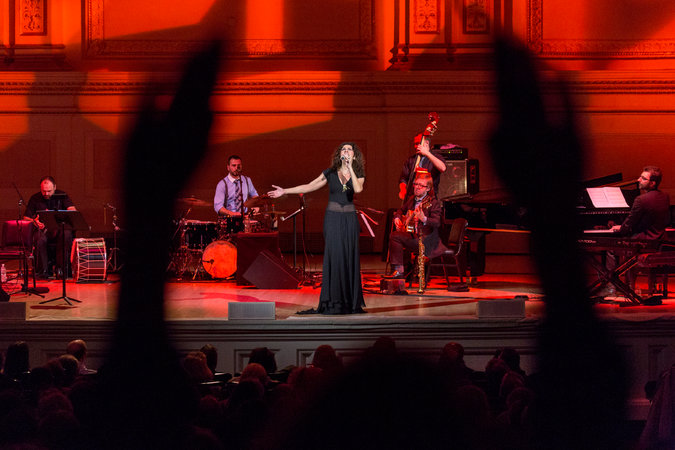Eleftheria Arvanitaki’s Adoring Fans Flock to Carnegie Hall
The Greek singer Eleftheria Arvanitaki, who performed for an adoring crowd on Saturday night at Carnegie Hall, is part of an international sorority of musicians who have merged national traditions with pop. She has collaborated with some of them, including Cesária Évora from Cape Verde, Buika from Spain and Dulce Pontes from Portugal, and in Greece Ms. Arvanitaki is so celebrated that she was chosen to sing her hit “Dynata” (“It’s Possible”; the word also means “strong”) at the closing ceremony of the 2004 Olympics in Athens.
Like her international peers, Ms. Arvanitaki trades some of the rawness of traditional styles for the refinement and variety of pop. She’s a soprano who merges sweetness with fervor, clarity and delicacy with a sense of sorrow and melancholy resolve. To an American listener, she could sound at times like Judy Collins infused with the modes and meters of Greek music. She has the many regional and urban styles of Greece and its neighbors to draw on, particularly the insistent syncopation and gathering crescendos of the urban folk hybrid rebetika, which can be both mournful and fierce.
Although Ms. Arvanitaki has recorded with all sorts of arrangements in a career that dates back to the 1980s, her Carnegie Hall group was largely acoustic, with Greek instruments — bouzouki, oud, hand drums, kaval (wood flute) — alongside trap drums, soprano saxophone and a rarely used electric keyboard.
Ms. Arvanitaki is not a songwriter, but she chooses songs that use the melodic directness of folk tunes to carry lyrics with poetic ambitions: love songs that can turn philosophical, thoughts of journeys and longings, laments and tales of exile. In “I Ask Love,” a hand-drum beat and a bouzouki line shadowed a terse melody that grew more impassioned with every verse, as the audience started clapping along. “I Burn and Melt Slowly” was sung in stately, ancient-sounding a cappella harmonies with her band members.
The concert’s peak was a group of songs with music by Ara Dinkjian, who wrote “Dynata” and went on to collaborate with Ms. Arvanitaki on the 1994 album “The Bodies and the Knives.” He joined her group onstage for the latter part of the concert, playing oud and cumbus, a banjolike instrument from Turkey. “The Bodies and the Knives,” with lyrics about love and painful memory, grew into a drum-driven incantation, both wounded and adamant; the ballad “Complaint-Exile” moved from heartache to determination. The audience members wouldn’t let Ms. Arvanitaki go until she had sung “Dynata” twice, as they wholeheartedly joined in.









